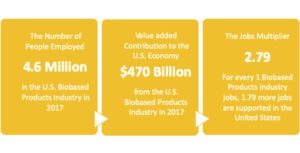USDA releases Biobased Economy report: A collaborative effort between NC State, Wichita State, and Duke University
I am proud to share the most recent study published by the USDA on biobased products and their growth in the United States. This report was released this past week by the USDA, and is the latest in a series of reports on the biobased economy, a collaborative effort by myself along with Jesse Daystar (a former NC State PhD student and VP of Sustainability at Cotton Inc, as well as an adjunct instructor at Duke University’s sustainability program) and Jay Golden (President at Wichita State University). The report is one in a series published by the USDA as mandated in the Farm Bill, that seeks to assess seven important questions regarding the contributions of the biobased products industry in the United States:
(i) the quantity of biobased products;
(ii) the value of the biobased products;
(iii) the quantity of jobs contributed;
(iv) the quantity of petroleum displaced;
(v) other environmental benefits;
(vi) the economic impacts of biobased exports; and
(vii) areas in which the use or manufacturing of biobased products could be more effective, including identifying any technical and economic obstacles and recommending how those obstacles can be overcome
Although there have been several other studies on the contribution of the biobased products sector to the global and European economies, this latest in a series of reports seeks to examine and quantify the effect of the U.S. biobased products industry from economic, job, and environmental perspectives, and this report provides an important update to past reports. The report is intended to provide a snapshot of available information and a platform upon which to build future efforts as more structured reporting and tracking mechanisms may be developed. This report is focused on biobased products and, as such, does not focus on biobased fuels or other energy sources except when analyzing co-products.
A new addition to this report is that we also report on the value of the exports of U.S. biobased products. Exports make important contributions to the GDP, and since we are in a truly global economy, exports provide a valuable market channel to support our farmers and growers in the agricultural community. The economic impacts of biobased exports were determined using export data from IBISS World and the IMPLAN economic model. Rather than a single section, we have embedded a summary of the growth of the exports in each of the different sectors, which are discussed next. The seven major sectors that represent the U.S. biobased products industry’s contribution to the U.S. economy covered in this report are:
- Agriculture and Forestry
- Biobased Chemicals
- Bioplastic Bottles and Packaging
- Biorefining
- Enzymes
- Forest Products
- Textiles

The big news of course is that most people have no idea how large this sector is in the economy. Our analysis showed that more than 4.6 million people are employed in biobased sectors, contributing more than $470B to GDP in 2017. For every 1 job in this sector, 1.79 more jobs are produced.
Agriculture is a big part of the biobased economy, and we salute the farmers and workers of the biobased economy. Although it is very small compared to petroleum-based industries, it is growing rapidly, and consumers are rapidly becoming more aware of it in their daily purchases.
- Categories:


